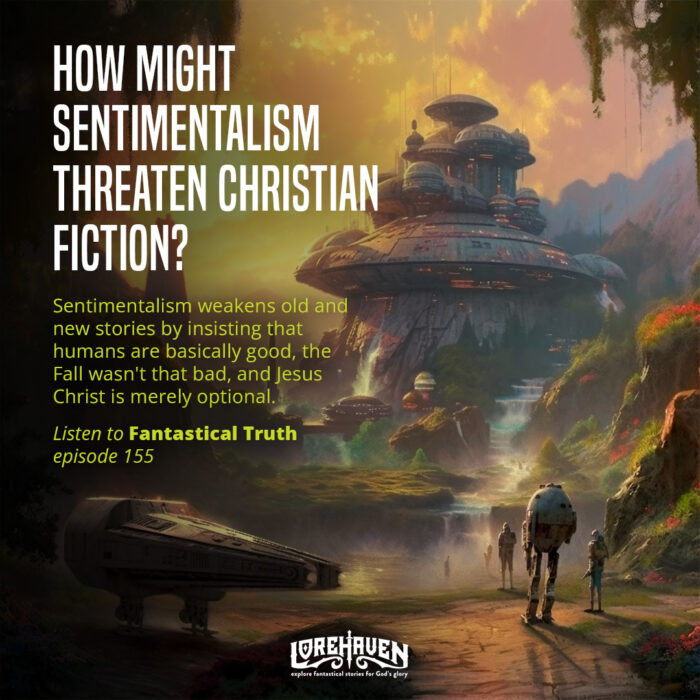155. How Might Sentimentalism Threaten Christian Fiction?
Podcast: Play in new window | Download (Duration: 1:04:43 — 60.6MB) | Embed
Today’s next Fantastical Foe doesn’t look that villainous. Instead she dresses up as whimsical kittens, cozy cottages, or obvious heroes and villains. He will approach you with pleasant platitudes, from a church, or even from that smiling popular fantasy author. She will shine like an angel of light, telling your heart beautiful lies such as, “Everyone is basically good, and you only need to fight something else.” Beware this second Fantastical Foe: Sentimentalism.
Subscribe to Lorehaven
articles • news • library • reviews • podcast • gifts • guild
Episode sponsors
- Enclave Publishing: Enhanced by Candace Kade
- Once Upon a Ren Faire by A. C. Castillo
- Realm Makers 2023 conference
Concession stand
- This episode isn’t so much about the “clean fiction” debate (episode 81).
- Our focus is not on old sentimentalities, but modern sentimentalities.
- We’ll not accuse Christian sentimentalists, but will make general allusions.
- Some villains attack “sentimentality” because they hate virtue and goodness.
- We don’t refer to healthy sentimentalism—a love for good things or memories.
Quotes and notes
- The Kinkade Crusade, Randall Balmer in Christianity Today, Dec. 24, 2000
- Brandon Sanderson Is Your God, Jason Kehe at Wired.com, March 23, 2023
- Thomas Kinkade’s Cottage Fantasy, Joe Carter at First Things, June 16, 2010
- “The Bob Newhart Show,” YouTube clip: “Stop it!”
- The Therapeutic, Ctd., Jake Meador at Mere Orthodoxy, March 22, 2023
- The Chosen Succeeds Where Woke Stories Fail, Jenneth Dyck at Lorehaven, Feb. 2, 2023
- Jon Acuff on “toxic empathy,” Jan. 17, 2023 tweet:
Toxic Empathy: When someone I love is headed toward a health, financial or relational train wreck and instead of telling them the bridge is out I encourage or even celebrate the decisions that are slowly destroying them because I want them to like me.
1. Old sentimentalism: People are mixed, church is good, world is mixed, Jesus is good (yet optional)
-

(Created by Zackary Russell using the Midjourney AI art generator)
This may be hard to define, so let’s start with a specific example.
- Imagine a Thomas Kinkade painting about a cozy forest or cottage.
- These images look nice, but if they ever bothered you, you’re not alone.
- The late Thomas Kinkade himself said in 2000, according to Christianity Today:
“I love to create beautiful worlds where light dances and peace reigns. … I like to portray a world without the Fall.”
- Kinkade, then, wants to show a world that’s basically good.
- It’s a “elseworld” that never even had a Fall into sin in the past.
- Older (stereotypical) Christian fiction often fell into this trap.
- In one 2016 article, Stephen explored this old fiction sentimentality:
Not all Christian novels are this way. We need to stop pretending they are. But I have read some of them that are still like this: They are written by, published by, marketed to and sold to Christians, but are based entirely around the story of an imaginary non-believer.
The secular character serves as wish-fulfillment for some of our over-sheltered evangelical desires. He/she is convinced by soft-soap clichés, such as “just take a leap of faith.” Or the secular character hears a good-cop-Christian assurance like, “Yes, God really loves you,” and are led to sentimental tears, rather than confusion or eye-rolls. Such secular characters act as if they somehow already understood the Law, which would mean Grace comes as a relief to them. But of course, in such stories, the Law doesn’t even make a cameo.
2. New sentimentalism: People are good, church is bad, world is mixed, Jesus is good (yet still optional)
- Now some creators react to this sentimentalism, thinking it unrealistic.
- But they overcorrect into false religions that share similar premises.
- You see this in some versions of Christianity, or spinoffs like Mormonism.
- It’s behind lines like, Everyone is just looking for… or If only we could…
- That’s new sentimentalism. Like the old kind, this denies human sin nature.
- Like the Kinkade paintings, they want to paint a world with a weaker Fall.
- Thus they show a world that doesn’t really need Jesus (even if He’s nice).
3. Our mission: Base reality and thus fantastical fiction in the gospel that rightly defines all these
- People started good, yet are corrupted by idolatry, yet can be redeemed
- Church is good, but can also be corrupted by idolatry, yet redeemed
- The world is good, yet was corrupted by humans, yet can be redeemed
- Jesus is not just good but nonoptional; He alone can redeem the others!
Lorehaven mission update
- Last week we hosted our booth at the Teach Them Diligently conference in Austin
- Last week we reviewed Please Return to the Lands of Luxury
- This Friday, March 31, we review Once Upon a Ren Faire
- Ticia Messing explores how parents can disciple kids with dangerous books
- New Lorehaven writer A. D. Sheehan will offer solutions to media malaise
- Lorehaven publisher E. Stephen Burnett joins two conferences in May
Com station
JJ Johnson shared his story in reply to ep. 153 about deconstructionism
In 2021 my wife began experiencing Church trauma & hurt at the church she worked on staff for 15 years- I became angry, bitter, & dangerously close to walking a road to deconstruction in 21 early 22. Seeing her hurt, my discernment was lacking & the philosophy felt attractive.
Deconstruction preys on the vulnerable, hurt, and promises much but lacks fulfillment. Deconstruction doesn’t develop your faith, it destroys it, and much like John 10:10 says it will “Steal, kill, and destroy…”
2 Peter 1:3 informs us of what we need. We need Christ Himself. My wife & I kept everything off social media during that time, only speaking to close friends who loved and provided the prayer & council we needed.
If you are struggling, hurting, or find yourself facing bitterness from trauma know that I understand. Deconstruction is not the answer. This is a highly recommended episode.
Next on Fantastical Truth
“We come to it at last: the great battle of our time.” What might be the fastest-growing religion in the world? Based on personal experience, some would say atheism, Islam, or bad versions of Christianity. Yet the world’s fastest-growing religion may be one we call Sexualityism. This refers to strong belief in one’s own sexual identity often leading to false worship. One guest who’s experienced with these beliefs, and taken some heat for this, joins us to enjoin this foe. How might this belief threaten not just biblical Christianity, but even some fantastical stories made by Christian creators?






























Share your thoughts about this podcast episode